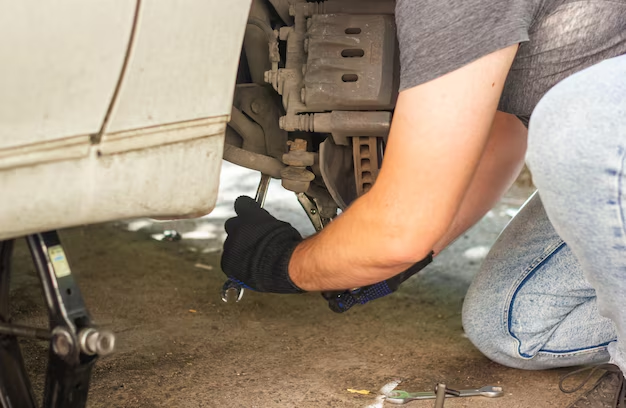
The Impact of Towing on Your Transmission
Every vehicle is built with a purpose, but not every vehicle is designed to handle the same kind of strain. For drivers who tow trailers, boats, campers, or heavy equipment, one of the biggest concerns is how towing affects the transmission. While towing makes it possible to haul more than your vehicle alone could carry, it also places unique demands on your transmission that can lead to wear, overheating, or even serious damage if precautions aren’t taken. Understanding how towing impacts your transmission and what you can do to protect it will help you extend the life of your vehicle and avoid costly repairs.

Why the Transmission Matters So Much in Towing
Your transmission is the link between your engine and your wheels. It manages power delivery, allowing your vehicle to accelerate, slow down, and adjust to different driving conditions. When you tow, your vehicle is no longer moving only itself. The added load means your transmission must work harder to keep everything running smoothly.
Think of it like walking versus carrying a heavy backpack. With no weight, you can move easily, but add 50 pounds, and suddenly every step takes more effort. The same principle applies to your transmission. Towing increases the workload, which in turn creates more heat, stress, and potential for long-term strain if not managed correctly.
The Main Effects of Towing on a Transmission
Towing can affect your transmission in several ways, each of which can shorten its lifespan if ignored.
- Increased Heat Buildup
Heat is the number one enemy of transmissions. Under normal conditions, transmission fluid helps regulate temperature and lubricates moving parts. When towing, the transmission works harder and generates more heat, which can cause fluid to thin out, lose its protective qualities, and allow internal parts to wear prematurely. - Higher Fluid Demands
Transmission fluid not only lubricates but also acts as a coolant. When towing, your vehicle may need more frequent fluid checks and changes to ensure it maintains the right level and viscosity. Low or dirty fluid while towing can lead to gear slipping, poor shifting, or even transmission failure. - Strain on Gears and Components
The gears inside your transmission are carefully engineered to handle power transfer. Towing heavy loads increases the torque demand, putting extra strain on those gears and clutches. Over time, this stress can cause them to wear down faster than they would under normal driving conditions. - Potential for Overheating
If the transmission overheats during towing, you may notice slipping gears, delayed shifts, or warning lights on your dashboard. Overheating is one of the fastest ways to shorten a transmission’s life, especially if it happens repeatedly. - Reduced Fuel Efficiency
While not directly damaging to the transmission, towing with an overworked drivetrain can decrease fuel economy significantly. The harder your transmission works, the less efficient your vehicle becomes overall.
Signs of Transmission Strain from Towing
Even if your vehicle feels like it’s handling a load well, towing can sometimes mask early signs of trouble. Paying attention to warning signals can help you catch issues before they become expensive repairs. Some common red flags include:
- Slipping gears when accelerating or climbing hills
- Delayed or rough shifting
- Burning smell from overheated transmission fluid
- Dashboard warning lights related to transmission temperature
- Unusual noises like whining or grinding while towing
If you notice any of these symptoms, it’s best not to ignore them. Continuing to tow under these conditions could cause major damage.
How to Protect Your Transmission While Towing
The good news is that while towing does increase stress on your transmission, there are proven ways to protect it and keep your vehicle running reliably.
- Know Your Towing Capacity
Every vehicle has a manufacturer-rated towing capacity. Exceeding this limit can overload the transmission almost immediately. Before hitching up, check your vehicle’s manual and stay within the recommended limits. - Use the Right Gear
Many vehicles have a “tow/haul” mode designed to adjust shift points and reduce strain. If your vehicle has this option, use it. If not, avoid overdrive when towing heavy loads, as it can overwork the transmission. - Install a Transmission Cooler
An auxiliary transmission cooler is one of the best investments for drivers who tow frequently. By helping reduce heat, a cooler prevents overheating and extends fluid life. - Stay on Top of Transmission Fluid
Regularly check fluid levels and quality, especially before long towing trips. Fresh, clean fluid provides the protection your transmission needs under heavy strain. In some cases, towing may shorten the recommended service interval, making more frequent fluid changes a smart choice. - Avoid Aggressive Driving
Rapid acceleration, high speeds, or sudden braking while towing puts unnecessary stress on your transmission. Drive steadily and allow your vehicle to adjust smoothly to changes in load or terrain. - Schedule Routine Maintenance
Even if you don’t notice issues, having your transmission inspected after periods of frequent towing is wise. A professional mechanic can check for wear, fluid condition, and performance concerns before they turn into breakdowns.

Why Professional Transmission Care Matters
Towing and transmission care go hand in hand. Many drivers underestimate the hidden strain their transmission experiences until it’s too late. By partnering with experienced transmission specialists, you can ensure your vehicle receives the attention it needs.
At Transmission Exchange of Chickasha, we’ve been helping drivers protect and repair their transmissions since 1984. With over 40 years of experience, our team understands the unique demands towing places on your vehicle. Whether you need a simple transmission flush, a complete rebuild, or advice on preventative upgrades like coolers, we provide solutions tailored to your vehicle and driving habits.
We’ve built our reputation on trust, transparency, and expert service, which is why generations of drivers in Chickasha and surrounding areas continue to count on us for their transmission needs.
Keep Your Transmission Strong for the Long Haul
Towing doesn’t have to mean transmission trouble. With the right precautions, maintenance, and professional support, you can tow confidently without risking costly damage. If you’ve noticed signs of transmission strain from towing or simply want to keep your system in peak condition, the time to act is now.
Contact Transmission Exchange of Chickasha today to schedule a transmission inspection or service. Our skilled technicians will make sure your vehicle is ready to handle the road ahead, whether you’re hauling a camper for a weekend getaway or towing equipment for work. With expert care and over 40 years of trusted service, we’ll help you protect your transmission and drive with confidence.

